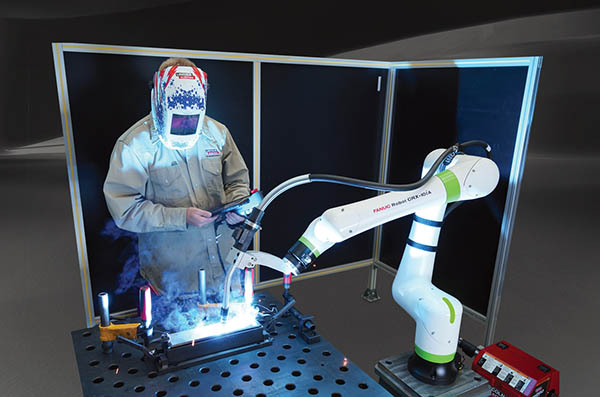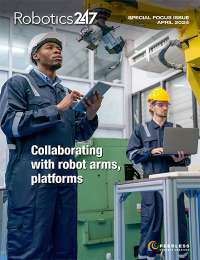FANUC America and the Manufacturing Skill Standards Council (MSSC) last week announced that they will co-market the stackability of their industrial certificiations. The organizations said their alliance will help address the acute shortage of skilled robotics and automation operators in U.S. manufacturing.
“The collaboration between FANUC and MSSC will provide a major benefit to employers looking to fill Industry 4.0 robotics and CNC technical positions,” stated Paul Aiello, executive director of education at FANUC America. “The manufacturing industry in the U.S. is facing a growing shortage of higher-skilled technicians vitally needed at the operator level.”
Rochester Hills, Mich.-based FANUC America is a subsidiary of Japan-based FANUC Corp. and provides CNC machinery, robots, and factory automation. It recently passed the milestone of 750,000 robots produced.
The Manufacturing Skill Standards Council is a training, assessment, and certification nonprofit focused on the core skills and knowledge needed by the nation’s front-line production and material handling technicians.
The nationwide MSSC System is based upon industry-defined and federally endorsed standards. It offers both entry-level and experienced workers the opportunity to demonstrate that they have acquired the skills increasingly needed in the technology-intensive jobs of the 21st century, said the MSSC.
FANUC, MSSC offer Industry 4.0 certifications
The U.S. supply chain is confronting a severe shortage of entry-level operator job applicants with the foundational skills and knowledge needed to perform complex operator tasks, said the partners. In addition, the accelerated use of emerging digital technologies in manufacturing is making it even more difficult to fill the skills gap.
FANUC offers Industry 4.0 Connected Smart Manufacturing occupational pathways and stackable certifications, beginning with the FANUC Certified Robot-Operator (FCR-O1 & FCR-O2) to develop entry-level skills for careers in robotics and automation.
The objective is to align students and job seekers on a pathway to become advanced automation operators, technicians, systems integration specialists, or engineers, said the company.
MSSC recently upgraded its signature Certified Production Technician (CPT) program for entry-level production technicians to add a fundamental understanding of Industry 4.0 technologies such as artificial intelligence, 5G networking, 3D printing, the Industrial Internet of Things (IIoT), data analytics, autonomous robots, augmented reality, nano-manufacturing, and advanced materials.
Streamlining the process
Both FANUC and MSSC offer their certification assessments through NOCTI/Nocti Business Solutions (NBS), a leader in industry-developed and recognized certification assessments that follow international standards for personnel certification (ISO 17024).
NOCTI/NBS have developed and validated the end-of-course assessments for both organizations to certify their technicians. The partnership creates a streamlined approach for schools and industry partners when administering the certifications.
“We look forward to incorporating the highly regarded MSSC foundational CPT certification programs into our robotics and CNC operator training pathways and will encourage our customers to use the CPT certifications as part of their employee training,” said Aiello.
Dr. Katherine Manley, an expert on industrial assessments, recently completed a detailed “crosswalk” between FANUC’s FCR-O1 and FCR-O2, and MSSC’s CPT and found a high level of complementary synergies between these two nationally portable industry certification programs.
MSSC said it offers the added benefit of a nationwide delivery system of some 2900 MSSC-trained instructors and 1900 MSSC-qualified test sites, mostly at high schools and community colleges, as well as 72 technical field representatives in all 50 states.
“Given the close fit between these FANUC and MSSC Certifications, we will encourage our entire nationwide network to use both to prepare individuals to build a robust pipeline of world-class robotics operators,” said Neil Reddy, CEO of MSSC. “The digital transformation of manufacturing globally requires the U.S. to build a highly competitive, next-generation, front-line workforce capable of keeping pace with technological change.”
Article topics
Email Sign Up



















